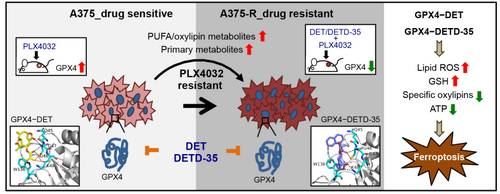Phyto-sesquiterpene lactones DET and DETD-35 induce ferroptosis in vemurafenib sensitive and resistant melanoma via GPX4 inhibition and metabolic reprogramming


Acquired resistance to vemurafenib (PLX4032) is a thorny issue in BRAFV600E mutant melanoma therapy. Ferroptotic programmed cell death is a potential strategy for combating therapy-resistant cancers. This study uncovers the adaptation and abnormal upregulation of PUFAs and bioactive oxylipin metabolism in PLX4032 resistant melanoma cells. Phyto-sesquiterpene lactone, deoxyelephantopin (DET), isolated from Elephantopus scaber and its novel derivative, DETD-35, induced lipid ROS accumulation and triggered ferroptotic cell death in PLX4032 sensitive (A375) and resistant (A375-R) BRAFV600E melanoma cells by reprogramming glutathione and primary metabolisms, lipid/oxylipin metabolism, and causing mitochondrial damage in which DETD-35 showed superior efficiency to DET. Decreased overall survival in BRAF melanoma patients was correlated with GPX4 overexpression by GEPIA analysis. We discovered that DET and DETD-35 are new types of GPX4 enzyme inhibitors through non-covalent binding. This study provides new insight into the therapeutic mechanisms of both DET and DETD-35 to combat PLX4032 sensitive/resistant BRAFV600E mutant melanomas via targeting GPX4 and ferroptosis.
Meng-Ting Chang, Li-Chu Tsai, Kyoko Nakagawa-Goto, Kuo-Hsiung Lee, and Lie-Fen Shyur* (2022) Phyto-sesquiterpene lactones DET and DETD-35 induce ferroptosis in vemurafenib sensitive and resistant melanoma via GPX4 inhibition and metabolic reprogramming Pharmacological Research, 178, 106148. (doi.org/10.1016/j.phrs.2022.106148)

